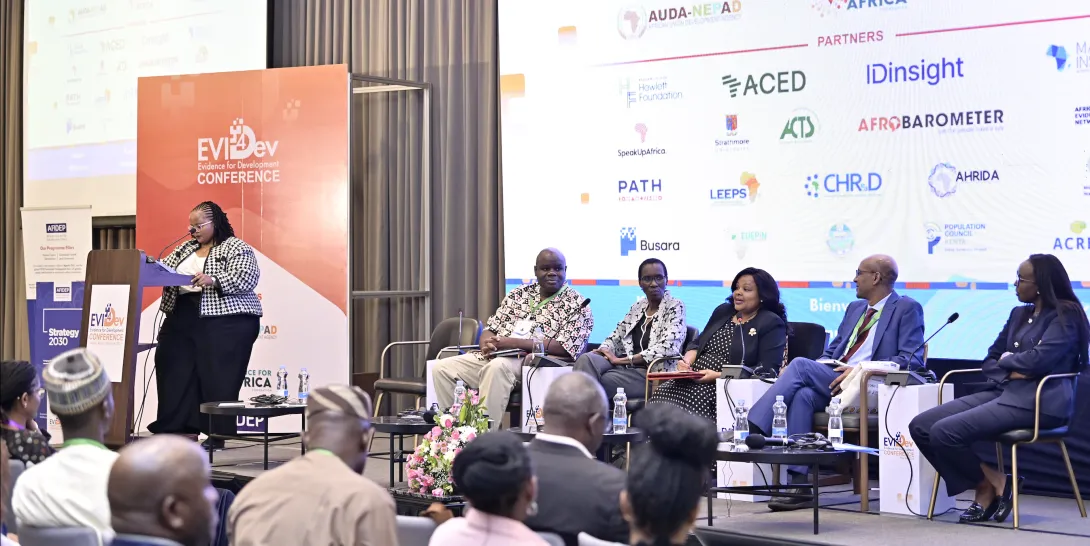
By Derick Ngaira
The second day of the Evidence for Development (Evi4Dev) Conference, themed “Strengthening Evidence-Informed Policymaking in Africa for the realisation of Agenda 2063”, offered a rich lineup of sessions centred on unlocking Africa’s development potential. Insights drawn from cross-cutting discussions emphasised the importance of the effective use of public resources, expanding civic participation, and enhancing citizen engagement across the region to support Africa’s Agenda 2063.
Session 14: Optimising domestic health financing for development in Africa
The discussions at the plenary centred on approaches that can be deployed to enhance domestic health financing to enhance healthcare delivery in Africa. As Official Development Assistance (ODA) declines, African countries were urged to shift their focus toward mobilising and optimising domestic resources for health financing.
The discussions emphasised the need to improve efficiency in spending and address fragmentation in service delivery. Innovative financing models, like health taxes, socially driven investments, and public-private partnerships, offer promising avenues for increasing revenue and sustaining healthcare delivery.
Technological solutions such as artificial intelligence (AI), machine learning, and big data analytics were highlighted as the game changers in tracking health investments, reducing wastage, and improving service delivery.
Key recommendations included progressively increasing health budgets in line with the Abuja Declaration to allocate at least 15% of their annual budgets to the health sector, expanding insurance coverage, and integrating vertical programmes for cost-efficiency. It was emphasised that Africa could reduce healthcare delivery costs by up to 40% through strategic planning and better resource organisation.
The session was chaired by Patrick Mugirwa, Acting Regional Director and Programme Manager at Partners in Population and Development Africa Regional Office (PPD–ARO), and moderated by Dr Cleopatra Mugyenyi, Senior Fellow at the African Institute for Development Policy (AFIDEP). Dr Jackson Otieno, Senior Research and Policy Analyst at AFIDEP, delivered a presentation on tackling inefficiencies in public health expenditure and exploring innovative financing mechanisms in Africa. The distinguished panel comprised Ms Chenai Mukumba, Executive Director of Tax Justice Network Africa; Mr Patrick Zimpita, Principal Secretary for Economic Planning and Development, Ministry of Finance, Malawi; Prof. John Ele-Ojo Ataguba, Executive Director of the African Health Economics and Policy Association (AfHEA); Dr Daniel Mwai, Presidential Health Advisor, Government of Kenya; Mr Kwame Owino, CEO of the Institute of Economic Affairs (IEA Kenya); and Dr Bona Mukosha Chitah, Lecturer at the Department of Economics, University of Zambia (UNZA).
Session 26: The central place of citizen evidence in accelerating Africa’s Agenda 2063 progress
This plenary emphasised that bridging the gap between government delivery and citizen expectations is central to realising Africa’s development goals. Despite constitutional obligations for citizen participation across countries in Africa, practical engagement remains shallow, especially among youth. The need to leverage digital platforms and local communication tools such as radio was highlighted to enhance inclusion.
Speakers noted that meaningful engagement must be informed by clear, accessible information. There were calls to introduce civic education from an early age, enhance feedback loops between institutions and citizens, and remove bureaucratic and structural barriers that hinder public participation. Scorecards and citizen assemblies were also pointed out as effective tools when properly contextualised and free from elite bias.
The session was moderated by Ms Natasha Kimani, Regional Director at Futurelect, and featured a panel comprising Dr Andrew Dabalen, Chief Economist for the Africa Region at the World Bank; Ms Dorothy Jemator, Vice Chairperson of the Commission on Administrative Justice; Hon. Mercy Kiiru Wanjau, Secretary to the Cabinet, Government of Kenya; and Prof. Winnie Mitullah, Research Professor at the Institute for Development Studies, University of Nairobi.
Session 27: Advancing inter-regional evidence-informed policymaking
This side session highlighted the experiences by partners in advancing inter-regional evidence-informed policymaking (EIP), including seizing opportunities and navigating challenges. They highlighted the need to ensure data quality by rigorous recruitment and training of survey field teams, addressing language diversity, and leveraging digital tools to reduce data fabrication. The use real-time electronic data checks and peer reviews also enhances integrity.
The panellists noted that African government receptivity to NGO-led research remains low. Additionally, foreign data sources are often perceived as more credible than local research, limiting the uptake of home-grown evidence. Barriers like restrictive legislation, fragmented data systems, and a lack of harmonised ethics frameworks further complicate inter-regional collaboration.
Proposals to address these issues included strengthening regional blocs as evidence hubs, promoting data harmonisation standards, and creating continental frameworks to fund and support community-aligned research. The role of communication in sharing evidence and celebrating African innovations was also mentioned to build legitimacy and inspire cross-country learning.
The session was moderated by Dr Rose Oronje, Director of Public Policy and Knowledge Translation and Head of Kenya Office at AFIDEP. The panel featured esteemed speakers including Ms Siziwe Ngcwabe, Director of the African Evidence Network, South Africa; Prof. Boniface Dulani, Director of Surveys at Afrobarometer, Malawi; Dr Frejus Thoto, Executive Director of the African Center for Equitable Development (ACED), Benin; Prof. Alex Rio Ario, Director General of the Uganda National Public Health Institute and President of the African National Public Health Institutes; and Dr Charlotte Ndum from eBASE, Cameroon.
Conclusion
The discussions on Day 2 of the EVi4Dev Conference reaffirmed that Africa's transformation hinges on its ability to leverage internal resources, amplify citizen voices, and foster a culture of evidence use across sectors. Furthermore, innovation, accountability, and collaboration can drive meaningful change and where African-led solutions take centre stage in shaping the continent’s development trajectory.
Watch the highlights here: https://www.youtube.com/watch?v=AJWzD8XLpFg

